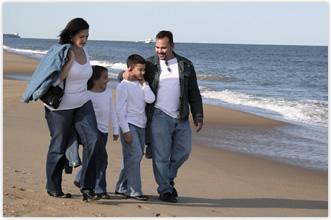Blog and News
Blog & News
Siblings of Children with Special Needs: Emotions
-

The siblings of children with special needs often experience a different range of emotions than their peers. Many times, their emotions are conflicting and change on a regular basis. The highs are higher, the lows are lower, and it is difficult to anticipate how they are going to react to their brother or sister’s condition at any given time. A common misconception exists that having a sibling with a special needs leads to a range of intense struggles throughout a child’s life. Ryan Macks, child psychologist at Cincinnati’s Children’s Hospitals says, “That is not necessarily true. The majority will handle the situation quite well”. With some empathy, attention, and parental support, children can manage these emotions in a healthy way and continue to accomplish great things. Below is a list of some emotions that your typically developing child may be dealing with and suggestions on how you can effectively help your child through their feelings.
Guilt
Guilt affects children who have siblings with special needs in many different ways. Some feel guilty because they do not have the condition, while others are embarrassed by their sibling’s condition or they feel bad because they teased their brother or sister about their condition. This guilt is misleading, regardless of the reasoning behind it. In these situations, you should help your child think rationally and talk encourage them to through their emotions with you.
Embarrassment
It is often embarrassing for siblings to invite friends over or have strangers stare at their sibling on outings. This becomes particularly difficult when children begin to reach the adolescent stage because social acceptance is viewed as very important. To help with this, give your child space and try not to make them feel guilty about these emotions. Most parents are pleased to find out that this embarrassment is usually age-related, and most children get over it by their later teen years.
Pressure
Typically developing children often set high, unrealistic expectations for themselves in order to compensate for what their sibling lacks. This can be positive and allow your child to succeed in many areas of life. However, parents should be careful that their children are not pushing themselves too hard. If your child never brings home any bad news, this could be a sign you need to talk. In these situations, children often feel that they cannot tell their parents negative thoughts because they want to spare them heartache. Talk to your child about how happy it makes you when they work hard, but emphasize that they can tell you anything and you will always support them.
Other Emotions
Some other emotions siblings of children with special needs feel are worry, fear, anger, resentment, and jealousy. The feelings of worry and fear are more prominent in typically developing children if their brother or sister’s condition is very serious. Feelings of anger, resentment, and jealousy can come from lack of attention, extra work to support or care for their sibling, or because they have to refrain from certain activities due to their brother or sister’s condition. There are many support groups that exist for children to get help with these emotions. It is important to recognize these emotions and get help for your child if these feelings seem debilitating.
Future Concerns
Today, children with special needs are routinely outliving their parents. Parents should have a plan to ensure that their child with special needs will receive the proper care when they are gone. It is never an easy conversation to start, but make sure to think about it early because there is rarely a straightforward solution. Siblings should be included in these discussions and back-up plans should be made because adult’s lives are constantly changing. Delegate roles and talk about financial resources. Try to make caring for their brother or sister less of an obligation and more of a choice.
Stay tuned for next week’s blog: Siblings of Children with Special Needs: Discussion
References
- Arc 3 Siblings. (2011). King County Developmental Disabilities Division Early Intervention Program http://www.youtube.com/watch?feature=player_embedded&v=Ve-yGz5KzYs#at=815
- Boyse, Kyla. Siblings of kids with special needs. University of Michigan Health Center. www.med.umich.edu/yourchild/topics/specneed.htm. Updated July 2009.
- Cook, Gretchen. “Siblings of disabled have their own troubles,” The New York Times, 4, April, 2006.
- Goldman, Russell. “The Heaviest Heart: Guilt and Genetic Disease”, ABC News. 24, March, 2009. http://abcnews.go.com/Health/story?id=7154193&page=1#.UcDFD-t1E7A.
- Gurian, Anita. Siblings of children with special needs. The Child Study Center: NYU Lagone Medical Center. http://www.aboutourkids.org/articles/siblings_children_special_needs.
- Hartwell-Walker, Marie. (2006). What about me? Support for the siblings of disabled children. Psych Central. http://psychcentral.com/lib/2006/what-about-me-support-for-the-siblings-of-disabled-children/.
- Kutner, Lawrence. (2007). When a Sibling is Disabled. Psych Central. http://psychcentral.com/lib/2007/when-a-sibling-is-disabled/.
- Mishori, Ranit. “Autism can have large effects, good and bad, on a disabled child’s siblings,” The Washington Post, 3, September, 2012.
- NPR, “Siblings with special needs change childhood”. 25, September, 2012. http://www.npr.org/2012/09/25/161754564/siblings-with-special-needs-change-childhood
- Schwartzberg, Neala. (2006). Parenting Siblings of Children with Disabilities. Parents. www.parents.com/parenting/better-parenting/teaching-tolerance/parenting-siblings-of-children-with-disabilities/?page=2.
- What siblings would like parents and service providers to know. Sibling Support Project. http://www.siblingsupport.org/publications/what-siblings-would-like-parents-and-service-providers-to-know.
Was this Helpful?
Your input helps us improve the site for parents and practitioners. Leave us feedback about this page.
Was this page helpful?
Ask an Expert
Have a question that’s not answered on Baby’s First Test? Send it to our experts.

Comment on This Post